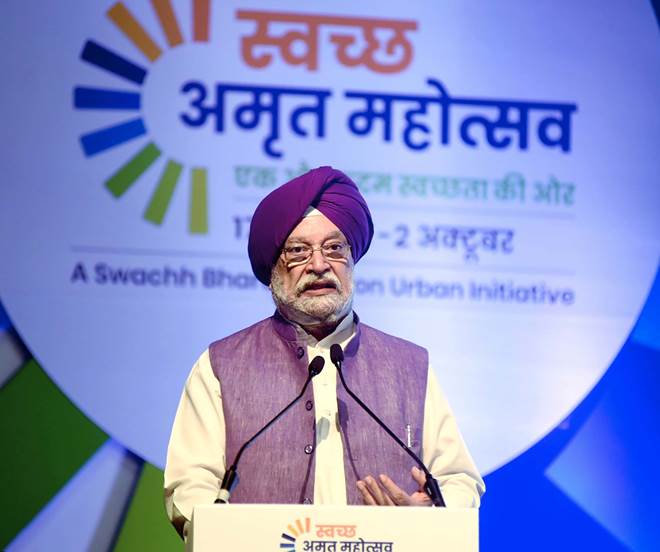
Speaking about India’s exemplary journey of becoming Open Defecation Free (ODF), Shri Hardeep S. Puri, Minister of Housing & Urban Affairs and Petroleum & Natural Gas, remarked that when the honourable Prime Minister announced the Swachh Bharat Mission from the ramparts of the Red Fort on 15 August 2014, he spoke of the need to make India Open Defecation Free (ODF) by the 150th birth anniversary of the Mahatma Gandhi in October 2019. Such a large-scale transformation had never been imagined before. Despite a poor performance on sanitation till then, India achieved the target of ODF in the next five years because the mission evolved to become a ‘Jan Andolan’ instead of a typical sarkari programme.

Addressing the inaugural event of Swachh Shehar Samvad and Tech Exhibition today, the Minister for Housing and Urban Affairs said that as a result of efforts under SBM, all 4,372 ULBs (100%) in India have now been declared Open Defecation Free (ODF). Not only did we build over 73.45 lakh individual and community toilets, we also restored dignity and health to millions of urban poor, including the Divyang Jan. At the same time, waste processing capacities of urban local bodies (ULBs) have increased from a mere 18% in 2014 to 73% at present. We are now accelerating implementation to reach 100% saturation at the earliest.
Swachh Shehar Samvad & the Tech Exhibition was inaugurated by Shri Hardeep S. Puri here today. Shri Manoj Joshi, Secretary, Ministry of Housing & Urban Affairs (MoHUA), senior officers from Ministry, representatives of State governments and other stakeholders were also present at the event.
Noting the importance of ‘Waste to Wealth’ for a circular economy and efforts of government for transforming India to a ‘Garbage-Free India’, Shri Hardeep S. Puri mentioned that “India is embarking on its next journey of Swachhata under the Swachh Bharat Mission (Urban) 2.0. We are now targeting to go from an ODF India to a ‘Garbage-Free India’. He further added that the second iteration of the Mission has been launched with an overall outlay of nearly 2.5 times of the first mission. The increased budget is an affirmation of the confidence placed upon the government by the people of lndia. Continuing with the ethos of SBM (U), the overarching principle towards this next journey of Swachhata is based on the philosophy of “waste to wealth”, and adopts the principles of circular economy as its core tenets.
During the event, the Minister highlighted the key actions and initiatives under the Swachh Bharat Mission. He mentioned about setting up of Material Recovery Facilities (MRFs) in every city for ensuring further sorting, processing or recycling of segregated dry waste and setting up of processing/upcycling facilities for Construction & Demolition (C&D) waste.
Speaking about the ‘Lakshya Zero Dumpsite Challenge’, the Minister said that all legacy dumpsites containing 16 crore metric tonnes of waste, and taking up 15,000 acres of prime land, will be remediated within the mission period. I am proud to note that Action Plans for over 1,000 legacy dumpsites—including those in Delhi—containing 12.8 crore metric tonnes waste have been approved by MoHUA, with total project cost of more than 8000 crore rupees, of which the Centre is contributing almost 3,000 crore rupees.
Bio-methanation plants and waste-to-energy plants are being put up in large cities, he said.
Swachh Shehar Samvad & the Tech Exhibition, inaugurated today is a capacity building initiative of the Swachh Bharat Mission Urban 2.0 to equip States and Cities with an understanding of all recent developments in waste management. It comprises high quality technical and administrative discussions specially curated around topics related to management of municipal solid waste and liquid waste to enable States and cities to deliberate on strategies, best practices, and challenges in their journey towards Garbage Free status. The Tech exhibition showcasing best-in-class models in waste management from across the country is also a part of the Samvad. Around 35 technology providers are demonstrating cutting edge technology in waste management. Working models are on display on various aspects of solid waste management/sanitation such as IT and GIS based applications, used water management, packaging options and 3Rs(Reduce-Recycle-Reuse), processing of municipal solid waste, mobile and portable units, construction and demolition waste and remediation measures. There are also thematic experiential exhibitions on mission initiatives inclusive of Garbage Free Cities, aspirational toilets, used water management etc.
RKJ/M

